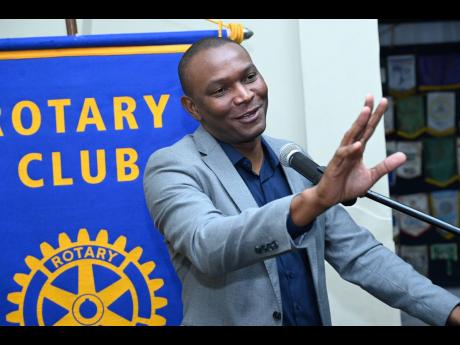JTA president: Decolonise education to fix performance
President of the Jamaica Teachers’ Association (JTA), Dr Mark Smith, has added his voice to recent calls for a paradigm shift in Jamaica’s education system to address the underperformance of students.
Noting the significant investment that taxpayers are making in education, Smith, who was speaking at the Rotary Club of New Kingston’s general meeting on Friday, said a change in the system is necessary to obtain maximum value.
An integral step in this process, he contends, is to first decolonise education. According to Smith, Jamaica’s education system still mirrors that of its former coloniser decades later, and does not benefit the majority of its citizens.
“We have come to a point where we have too many able bodied Jamaicans who are not benefiting from it, and there is only a matter of time before it becomes untenable for us to stay here – the ones who have done well in the system – if we can’t figure out some mechanism by which we can get them on board to validate,” he said.
He also chastised what he described as a “disjointed approach” to education policy implementation. Smith theorised that this is one of the main reasons the monetary investment being made in the sector is having very little impact.
But of significance too, he noted, is to ensure that the monies are being channelled in the right areas.
“That money is not to fuel the great bureaucracy of government and the Ministry of Education, but to ensure that it gets down to the grassroots, it gets down to the ground where you have a teacher standing face to face with a student,” the JTA president said.
FIX PRIMARY LEVEL
The academic performance of Jamaican students has been under the microscope since the release of the Caribbean Examinations Council (CXC) exams results last month.
Only 18 per cent of Jamaican students who sat this year’s Caribbean Secondary Education Certificate (CSEC) exams received five or more subjects, inclusive of mathematics and English.
This is a three percentage point decrease when compared to last year.
The number of students who achieved passing grades in the CSEC mathematics and English exams, when compared with 2023, also decreased – 33 per cent of the students obtained a passing grade in maths, while 74 per cent passed English.
These pass rates were also below the average across the Caribbean region of 36 and 76 per cent for the respective subject areas.
Concerns over the consistent mediocre performance of students have reinvigorated calls for change at the primary level of education; one that Smith also echoed.
“What we need to do is be more inclusive and ensure that we don’t have children leaving school at the primary level and they are not reading at the appropriate (level) or doing math at the appropriate level,” he said.
Data from the 2021 Patterson Report, which reviewed Jamaica’s education system, revealed that 59 per cent of students who had completed primary school in 2019 were failing mathematics, while 45 per cent were failing language arts.
“We talk a lot about differentiation and different pathways, but at the end of the day if we can fundamentally fix what happens at the primary level, I think we can negate a lot of these issues that we are facing,” the principal of Munro College and educator for more than 20 years said.
Another of Smith’s gripe with the current structure of the country’s education sector is the ranking system, which he refers to as “our national pastime”.
“We need to move away from a fixation on individual accomplishment and look at, as a country, how we can collaborate around mutual ideas that ensure that all Jamaicans do well, not just a few,” he said.
“It is time to rebalance our priorities and to cultivate a more supportive, inclusive and empowering Jamaican society.”

